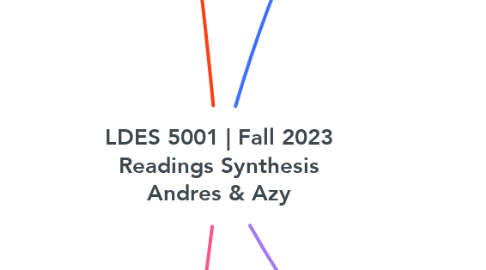LDES 5001 | Fall 2023 Readings Synthesis Andres & Azy
von Yianna Vovides

1. Who are universities designed for?
1.1. Based on these experiences, who is Rawlings College (and similar real institutions in the United States) probably designed for? Who is the “default” user (whether explicitly stated or otherwise)? What concrete steps need to be taken to build the accommodation of diverse students into the system itself rather than treating them as anomalies? Ultimately, is higher education even a proper avenue for contending with wealth inequality?(Hasini)
1.2. Many universities, as exemplified by the reading on Georgia Southern book burnings, are designed to accommodate, educate, and make comfortable a very specific population of students: white and wealthy. I wonder how this is changing, as more students opt for alternative college experiences and the public has begun to question the pricing, benefits, and efficacy of the traditional 4-year-college experience. (Amanda)
1.3. For students forced to make sacrifices like Lizet, what impact does a lack of understanding (from their educators, peers, and families) have on their sense of self? What might this suggest about the sustainability of a system that isolates students? How can we design educational institutions such that students do not have to sacrifice their identities and relationships to “succeed”? (Hasini)
1.4. I wonder why Lizet is having to seek out the Learning Strategies Center on her own. The committee that oversaw her plagiarism hearing surely could have guided her towards this resource to seek support for citations, studying, etc. (Amanda)
2. Cultural and Ethnic Diversity in schools
2.1. I wonder if there are any ways to improve cultural humility and understanding in university spaces? Maybe make it part of the first-year experience? (Kartikeya)
2.2. How can schools and teachers encourage students to participate and take pride in a school environment different from their culture? (Azy)
2.3. Is the offense caused by people asking where she is really from forgiven at all by their genuine interest in her background? Is embracing someone’s culture for the novelty of it better or worse than not acknowledging it at all? (Melanie)
2.4. ... I also believe that generalizing the White American experience, just as generalizing my experience as a Black American, is a flawed approach. Every student's learning journey is intricately woven into a complex web of individualized contexts. My question for this week is this: Do you agree with my statements? Why or why not? (Jess)
3. Sense of belonging
3.1. I wonder what are ways to cultivate a sense of belonging for first-gen students. (Kartikeya)
3.2. Can universities design opportunities and systems that allow families to connect with the school community, and build a sense of understanding about the value of the experience, as to better support the student holistically, accounting for the possible “mismatch between what students have learned in their home culture and what is expected at school” (HPLII, p. 21)? (Amanda)
3.3. How can connection and belonging contribute to positive self-perception, and the ability to identify academic challenge as an obstacle to overcome, rather than a flaw in character or capability? (Amanda)
3.4. Instead of being herself, she became Jillian’s Cuban friend Liz with the tough boyfriend. Her fear of seeming “white” to her sister paired with her fear of not fitting in at school created a purgatory between worlds that we see Lizet navigating throughout the book. Does Lizet’s awareness of the irony of her behavior forgive that behavior? If so, how much? (Melanie)
4. Freedom of speech in Universities
4.1. What are your thoughts on the balance between freedom of expression and responsible discourse in a university setting, especially in the context of the book burning incident? (Milos)
4.2. What are the boundaries or responsibilities for educational institutions when it comes to preserving freedom of expression while maintaining a safe and inclusive environment for all students, especially in the context of controversial incidents like book burnings? (Sicong)
4.3. How do you think universities can better prepare students to engage with challenging texts and navigate sensitive discussions? (Milos)
4.4. After reading about the statement the university made, it made me wonder what stance GU would take. Is a punitive approach the right one here? Additionally, I wonder if it were up to us, learning designers to develop a learning experience based on the book burning incident. How would we tackle difficult conversations? I would like to hear the different perspectives from my classmates in this regard. (Andrés)
4.5. … I believe that burning books is never an appropriate response to intellectual disagreements. Do you agree with my statements? Why or why not? (Jess)


